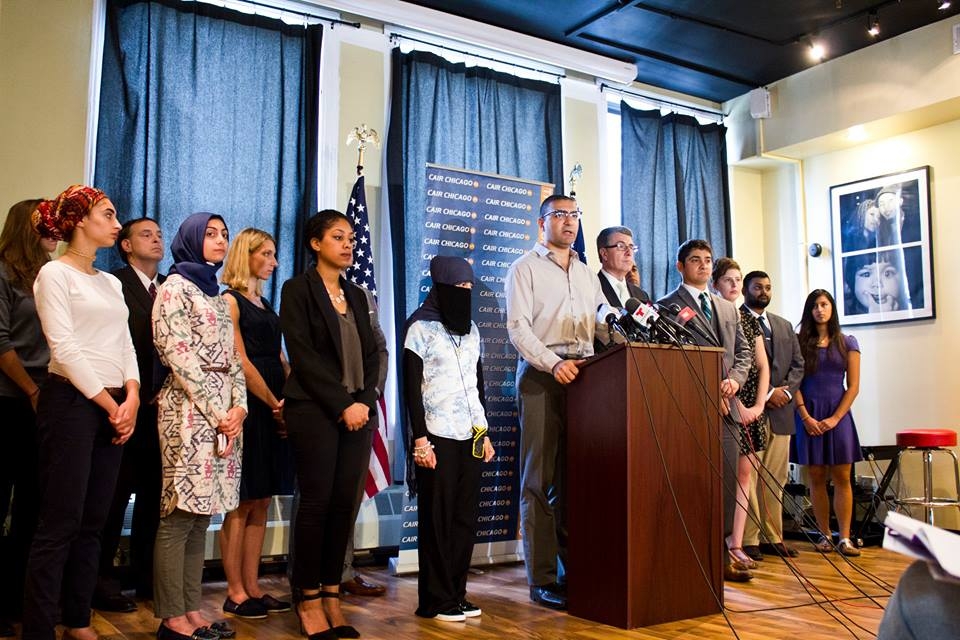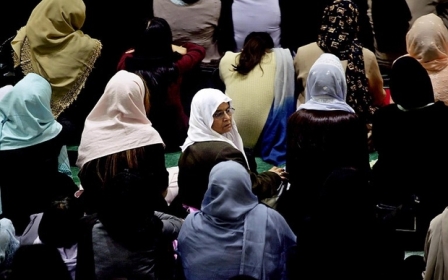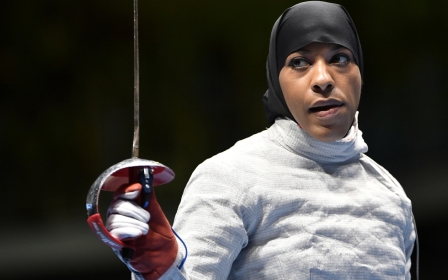Muslim woman sues Chicago police for wrongful arrest
Saudi student Al-Matar is suing city of Chicago and six police officers for violating civil rights

Ahmed Rehab, with Itemid Al-Matar to his right, announcing lawsuit (courtesy of CAIR)
Published date: 13 August 2016 10:15 BST
|
Last update: 8 years 3 months ago
CHICAGO, United States - After several men tackled Itemid al-Matar on the stairs of a Chicago train station, she thought they were robbers; it was not until she saw their uniforms that she realized they were police officers, according to her account.
Al-Matar, 32, a Saudi who had been in the US for a year studying English, is suing the City of Chicago and six police officers over the incident, which occurred in July 2015, during the Muslim holy month of Ramadan.
Surveillance footage from the station shows officers chasing Al-Matar up the stairs before arresting her.
The lawsuit says police "threw [Matar] down upon the stair landing". It accuses the officers of violating her civil rights.
In the incident report, police said Matar displayed suspicious behavior and was “furiously clutching her backpack".
The backpack turned to be filled with food for her iftar meal, to be eaten after fasting.
In addition to the hijab head scarf, the Saudi student wears the niqab face covering. The lawsuit alleges that officers stripped off her religious head garment, verbally taunted her and "publicly stripped her to her underwear while she remained handcuffed on the ground".
The Council on American Islamic Relations (CAIR) in Chicago announced the legal complaint on Friday.
The police had charged Matar with reckless conduct and counts of obstructing justice last year after her detention.
One count was dismissed, and she was found not guilty on the other charges.
"We believe that she was charged falsely as a cover-up for the police actions," Ahmed Rehab, the executive director of CAIR-Chicago, told Reuters. "Policing should be concerned with illegal activity and violations of laws, not people’s clothing."
Rehab described Matar's detention as unprovoked, unlawful violence, saying that Chicago police have a history of institutionalized racial and religious biases.
"That someone would be subjected to this wanton abuse is intolerable," he said in a statement. "Policing can and should function effectively within the parameters of our civil rights laws, and the standards of public service sworn to under oath."
In a statement, the Chicago Police Department said it does not comment on pending litigation, adding that officers work diligently to investigate threats and fight crime. "We strive to treat all individuals with the highest levels of dignity and respect," it said.
Hoda Katebi, a spokesperson for CAIR-Chicago, said the lawsuit comes at a time of heightened Islamophobia that is being fueled by the US presidential election.
"When bigots are given a platform to espouse their hate-filled rhetoric, this in turn encourages and allows others to think this sort of disgusting and unacceptable behavior is OK," Katebi told the Middle East Eye via email. "Islamophobia is now largely normalized in the United States thanks to the current election cycle."
Republican nominee Donald Trump has proposed banning Muslims from entering the US and got into a feud with the family of a fallen Muslim American soldier.
In a similar blunder, an Emirati tourist was arrested at gunpoint in Avon, Ohio, in June after a hotel clerk thought he was a terrorist because of his traditional UAE clothing.
Ahmed al-Menhali, 41, who was wearing a dishdasha (long white robe) and a hattah headscarf at the time of his arrest, is suing the city for damages.
In response to the incident, the UAE urged its citizens to refrain from wearing the national dress while traveling.
New MEE newsletter: Jerusalem Dispatch
Sign up to get the latest insights and analysis on Israel-Palestine, alongside Turkey Unpacked and other MEE newsletters
Middle East Eye delivers independent and unrivalled coverage and analysis of the Middle East, North Africa and beyond. To learn more about republishing this content and the associated fees, please fill out this form. More about MEE can be found here.




